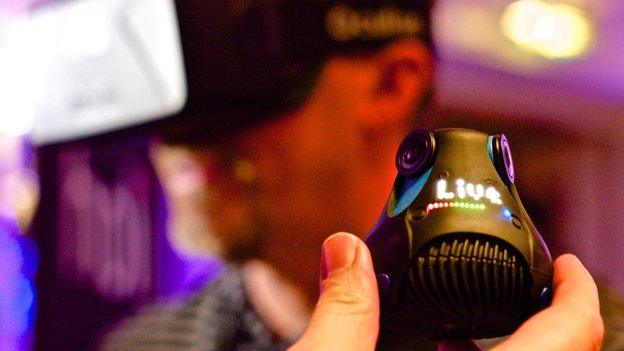CES 2015: Sleep, faffing and rollerskates
- Published
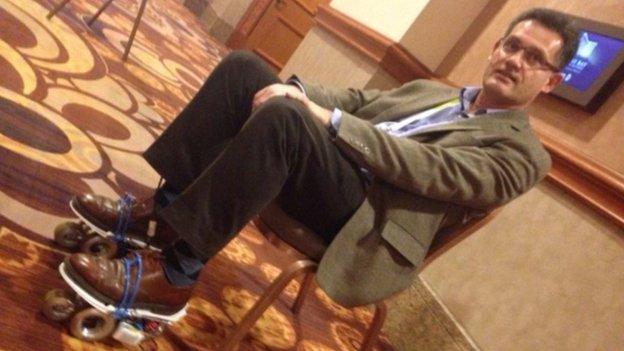
The next big thing?
The Consumer Electronics Show (CES) here in Las Vegas hasn't even officially started yet - but already there are some weird and wonderful gadgets on display at the enormous hotels playing host to the annual tech-fest, now in its 47th year.
Thousands of exhibitors, journalists and industry experts attend the trade fair, which is not open to the public.
Everybody tries to get sneak peeks beforehand, and some gadgets are just not easy to hide - I bumped into Thierry Reymond, of Rollkers, sitting, as nonchalantly as he could, in a hotel corridor with a pretty conspicuous pair of prototype wheels strapped unceremoniously to his shoes.
I asked him what on Earth he was wearing. They were a form of personal travelator, he whispered, and would double your walking speed.
"I had a pair of those as a kid, but I called them rollerskates," said one unimpressed tweeter in response.
Ruthless data-gatherers
Determined to see more, I elbowed - literally - my way into last night's CES Unveiled, a preview event where selected companies got to show off their wares ahead of their competitors.
It took a short while to acclimatise to the sheer number of products blinking, buzzing and in many cases looking right back at us.
At first glance, some of it looked decidedly old-school - plant pots, toothbrushes, a bedside lamp.
But you won't find these in a school jumble sale any time soon.
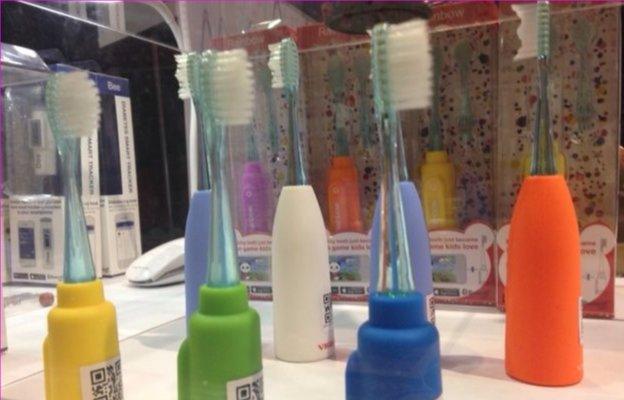
These toothbrushes are designed to monitor how well your kids are cleaning
Connectivity is going to be a big tech theme this year according to the analysts and all these items are ruthless data-gatherers, gathering information about your habits (good and bad) and sharing them with your phone, tablet, laptop - and in some cases each other - to build up an accurate picture of you.
Among the more colourful stands was a company called Holi with its Smart Lamp and Sleep Companion, a smartphone-controlled coloured light that relaxes you into sleep with warm red and pink light and wakes you up gently with the help of a blue hue.
The reds and pinks direct the body to release sleep hormone melatonin, the company claims, and the blue light wakes the body up before the alarm wakes the mind.
The Rollkers look like electric roller skates and aim to give the same sensation as so-called airport travelators
If you do wake up in the night, you can activate a seven-minute "meditation programme" of light sequences to lull you back to sleep again. It doesn't work on babies though, which is annoying for the parents of infants with sleep issues, who probably need it most.
The lamp also monitors your bedroom environment using, among other sensors, your smartphone's microphone to track noise levels.
It can share this data with whatever you like - including fitness bands, Google Health or a smart-home set-up such as Nest, in order to improve your sleeping habits.
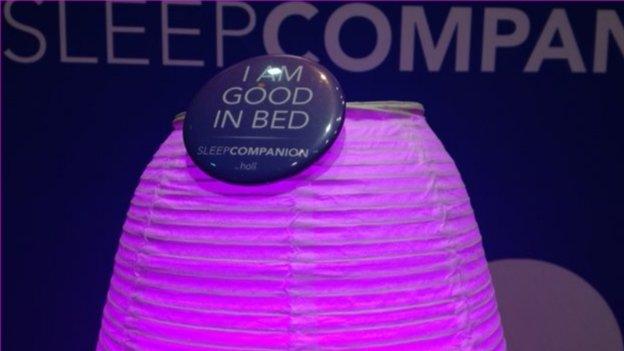
Smart this, smart that - this is a smart lamp to help you sleep
Oh, and if you're not that tired, there's also a "romance" button you can press on your phone, which activates a soft light as a visual clue to your partner that something other than sleep might be on the cards.
Somehow I can't see that having the desired effect… but maybe in Paris, the city of love, where the lamp was developed, people are more, well, receptive to that sort of hint.
What a faff
For some reason there was a lot of French tech at this year's final preview. The French exhibitors even had their own little sub-brand - "La French Tech" - and was it coincidence that the buffet was loaded with mountains of cheese? I think not.
Another French gem was the Parrot Pot, a plant pot that contains sensors to measure soil moisture, temperature, sunlight and fertiliser.
Due to go on sale this year, it will enable you to look after your favourite flora via your smartphone for up to four weeks without actually getting your hands dirty - the app is pre-loaded with the care requirements of 8,000 varieties of plant.
If touching your touchscreen has become a bit of a faff, Ring, by Logbar, is a device that enables you to operate your device by simply waving your finger at it instead.
In honesty for me this soon became an even bigger faff - the ring has to sit on your index finger, the sensor has to be in a certain place and you have to press it with your thumb in order for it to be work.
Despite much patience from the demo staff, mine never did do what it was supposed to. Perhaps the sensor had also picked up on my scepticism.
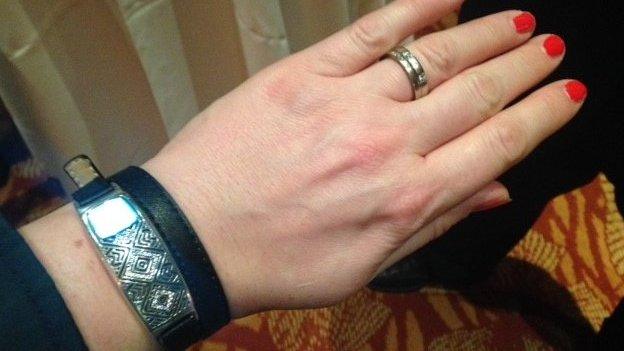
This bracelet lights up with different colours when you receive messages
Time to move swiftly on to Rainbow Kids - an electric toothbrush aimed at eight- to 14-year-olds.
It contains a gyroscope and accelerometer and syncs with a phone app to share data about how well your child is brushing their teeth.
There's also a game they can play to encourage good brushing. There are adult smart toothbrushes set to debut here this week as well - health monitoring is forecast to become another big theme in the tech world in 2015.
If all of this is starting to feel like information overload, a start-up called Viaware may have the answer.
Exhibiting at a separate event for start-ups, accessible via some very curious shuttle buses decked out with neon lights and inexplicable empty ice buckets, Viaware's offering is a bracelet that you can programme to light up in different colours when you receive messages on your phone from various people.
There were 256 possible colours but they only recommended using eight, said founder Ben Isaacson.
But what if somebody contacts you and you don't have them in your bracelet?
"You'll find out when you next check your phone," said Mr Isaacson.
"Perhaps they're not that important."
Not important? Now that's something you don't hear very often at CES…
- Published2 January 2015
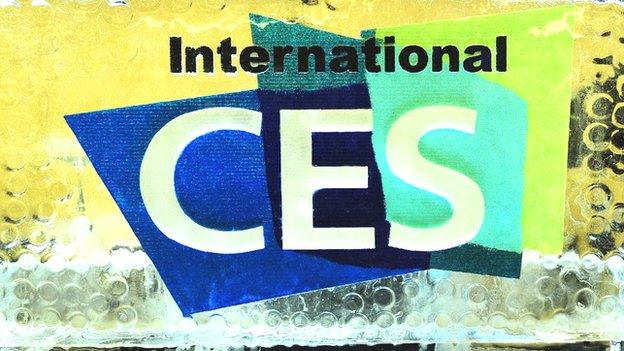
- Published2 January 2015
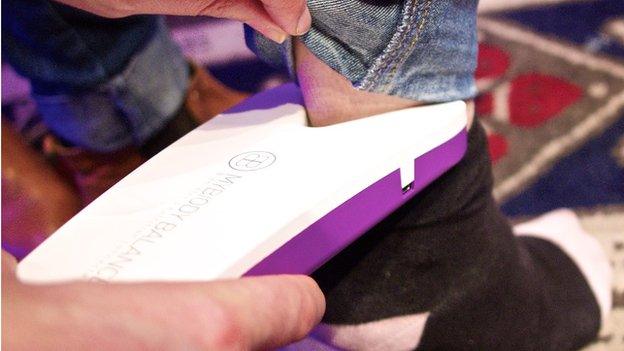
- Published3 January 2015
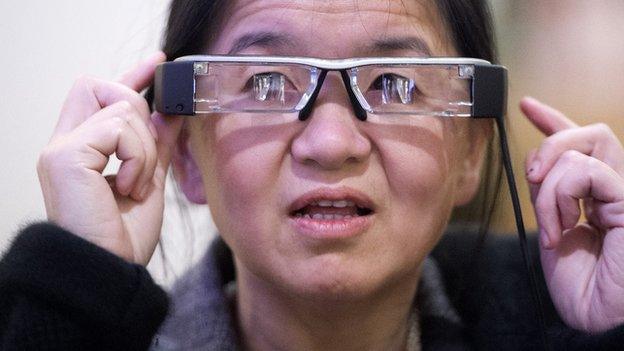
- Published2 January 2015
